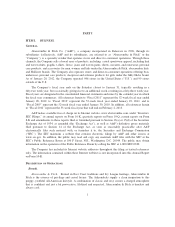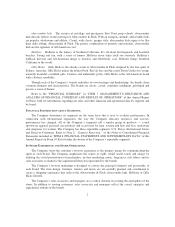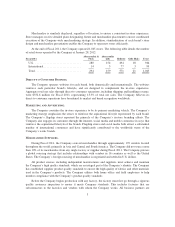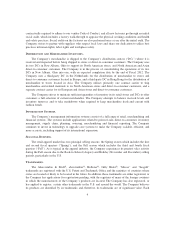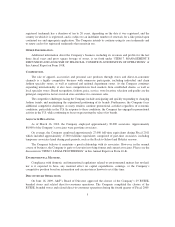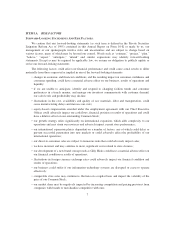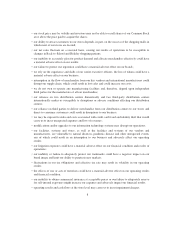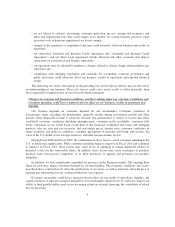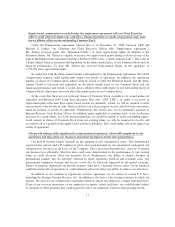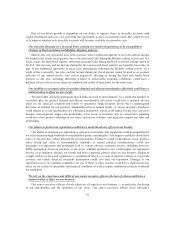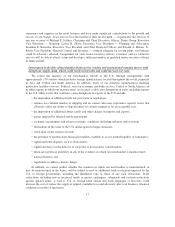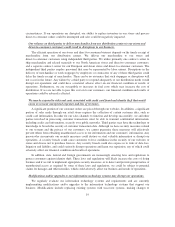Abercrombie & Fitch 2011 Annual Report Download - page 14
Download and view the complete annual report
Please find page 14 of the 2011 Abercrombie & Fitch annual report below. You can navigate through the pages in the report by either clicking on the pages listed below, or by using the keyword search tool below to find specific information within the annual report.
Equity-based compensation awarded under the employment agreement with our Chief Executive
Officer could adversely impact our cash flows, financial position or results of operations and could
have a dilutive effect on our outstanding Common Stock.
Under the Employment Agreement entered into as of December 19, 2008, between A&F and
Michael S. Jeffries, our Chairman and Chief Executive Officer (the “Employment Agreement”),
Mr. Jeffries received grants (the “Retention Grants”) of stock appreciation rights. In addition to the
Retention Grants, Mr. Jeffries is eligible to receive two equity-based grants during each fiscal year of the
term of the Employment Agreement starting with Fiscal 2009 (each, a “Semi-Annual Grant”). The value of
a Semi-Annual Grant is uncertain and dependent on the future market price of our Common Stock and our
financial performance. To date, Mr. Jeffries has received Semi-Annual Grants, in the aggregate, of
3,752,259 stock appreciation rights.
In connection with the Semi-Annual Grants contemplated by the Employment Agreement, the related
compensation expense could significantly impact our results of operations. In addition, the significant
number of shares of Common Stock which could be issued to settle the Retention Grants and the Semi-
Annual Grants is uncertain and dependent on the future market price of our Common Stock and our
financial performance and would, if issued, have a dilutive effect with respect to our outstanding shares of
Common Stock, which may adversely affect the market price of our Common Stock.
In the event that there are not sufficient shares of Common Stock available to be issued under our
Amended and Restated 2007 Long-Term Incentive Plan (the “2007 LTIP”), or under a successor or
replacement plan at the time these equity-based awards are ultimately settled, we will be required to settle
some portion of the awards in cash, which could have an adverse impact on our cash flow from operations,
financial position or results of operations. Furthermore, the awards may not be deductible pursuant to
Internal Revenue Code Section 162(m). In addition, under applicable accounting rules, if our stock price
increases to a point where, as of any measurement date, we would be unable to settle outstanding equity-
based awards in shares of Common Stock from our existing plans, we will be required to classify and
account for all or a portion of the equity-based awards as liabilities. This could further adversely impact our
results of operations.
Our growth strategy relies significantly on international expansion, which adds complexity to our
operations and may strain our resources and adversely impact current store performance.
Our growth strategy largely depends on the opening of new international stores. This international
expansion has placed, and will continue to place, increased demands on our operational, managerial and
administrative resources at all levels of the Company. These increased demands may cause us to operate
our business less efficiently, which in turn could cause deterioration in the performance of our existing
stores or could adversely affect our inventory levels. Furthermore, our ability to conduct business in
international markets may be adversely affected by legal, regulatory, political and economic risks. Our
international expansion strategy and success could also be adversely impacted by the global economy.
Failure to properly implement our growth strategy could have a material adverse effect on our financial
condition and results of operations or could otherwise adversely affect our ability to achieve our objectives.
In addition, as we continue to expand our overseas operations, we are subject to certain U.S. laws,
including the Foreign Corrupt Practices Act, in addition to the laws of the foreign countries in which we
operate. We must use all commercially reasonable efforts to ensure our employees comply with these laws.
If any of our overseas operations, or our employees or agents, violate such laws, we could become subject
to sanctions or other penalties that could negatively affect our reputation, business and operating results.
11


